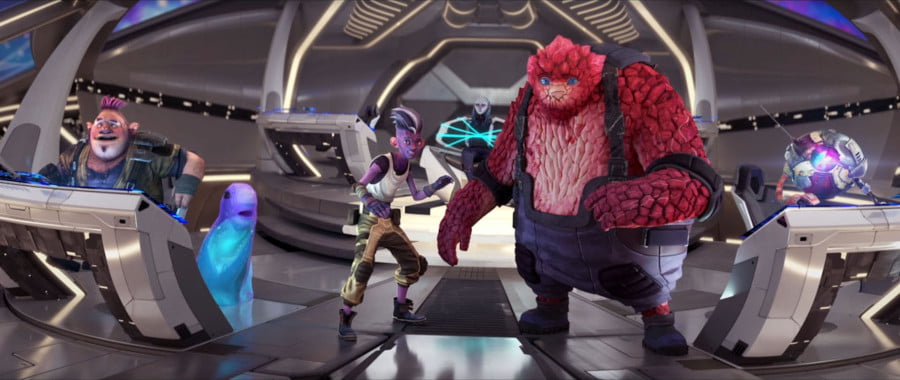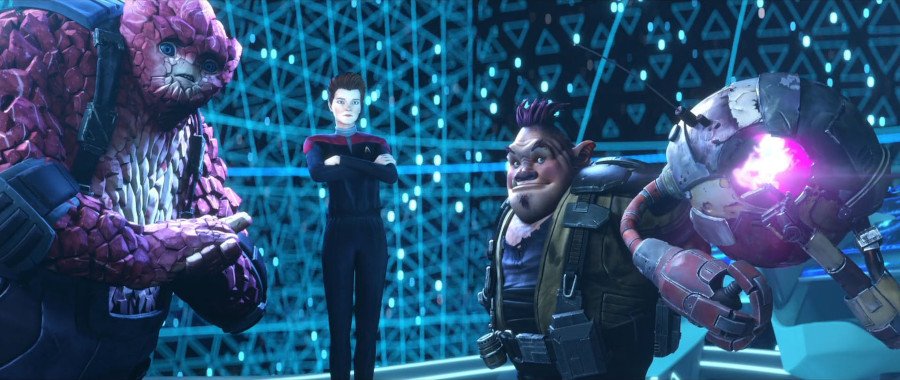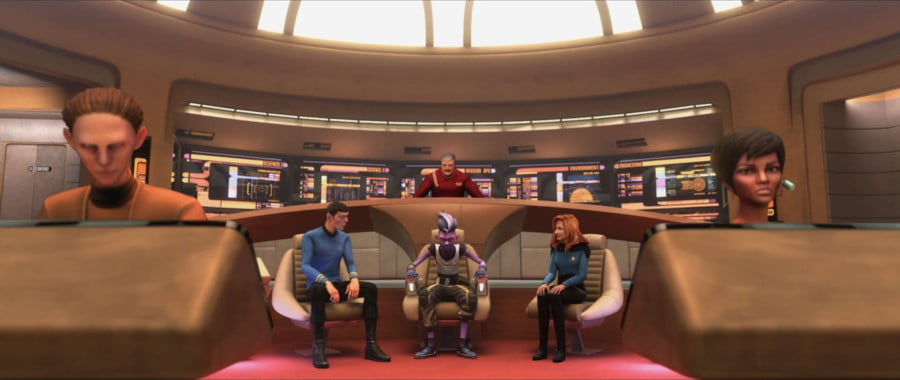I don’t know at what point in my life I went from ‘never watched any Star Trek‘ to ‘keeping up with multiple ongoing Star Trek shows,’ but here we are. And this time, rather than the seemingly divisive ‘comedy’ of Lower Decks that I definitely didn’t pirate or the equally divisive space-travel adventure of Discovery, I’m instead talking about the divisive children’s cartoon of Star Trek Prodigy.

If you want the simplest opinion on it: I like it. It’s very much a kid’s cartoon, and that means the central characters are kids, but that works out okay for the premise of the show. If you just want to know if there are landmines to look out for, I haven’t encountered any so far, and I like all of the show I’ve watched so far, even if it’s just cresting the heights of ‘pretty good.’
Now, on to more detail.
The premise of Star Trek Prodigy runs thus: We start on a mining platform in space, where our protagonist, Dal, wants to escape. This platform is populated by a fairly diverse range of alien weirdoes, and is overseen by a cruel… over…seer. Crucial detail, the overseer has a daughter, who’s about Dal’s age. She is an expert in languages and is also a trained like, semi-ninja.
Anyway, the secret of the platform is there’s a buried Federation ship on it, and our heroes band together to steal the shit out of it, and flee from the mining platform, setting up a classic kid’s cartoon story of I Have The Cool Thing (And Now I Need To Keep It). They also steal the Overseer’s daughter, which starts out as a hostage thing, then she comes around and joins the heroes. You know how that kind of thing goes.
Then you get a series of episodes, where they end up in a planet or not, dealing with that episode’s problem, as they try to learn about one another, about their deliberately isolated former home, about this mysterious ‘Starfleet’ thing, and most of all: About themselves.

The extensive chase is a wonderful premise for a kid’s cartoon, giving you both a sense of momentum and a way to break up the story in episodic ways. So far, that’s how Prodigy has worked, and it feels like a nice throwback to your classic Lost In Space kind of narrative. Here’s a new place, here’s its problem, here’s the best solution a bunch of stupid kids with a holographic Federation Mom can come up with, and we move on.
There is a measure of what you’d probably consider ‘lore’ or ‘callbacks.’ Numerous references to specific cultures or moments or artifacts from the history of Trek, which,you know, you may find really cool. There’s onee episode on the holodeck, for example, brings back some characters whose actors have died, speaking from historical clips. It’s probably a cute idea, and if you’re really heavily invested in the periods these actors are from, and feel their deaths very deeply, it probably hits you pretty hard.
I’m not sure how well it lands for me, though, because it mostly made me notice the difference in sound quality.

It’s a pretty good show, but you may think this kind of thing sucks about it, and Star Trek in general, because Star Trek has, I don’t know, never cheapened itself to self-referential media, I say, laughing hollowly.
You know, saying it like that, I can’t help but notice that Star Trek is really divisive. I mean, not in general, from what I can tell most general audiences really like Star Trek, but Star Trek fans seem to be really divided on whether or not Star Trek is good. That’s got to be rough.
I feel like I make this joke and-or observation every time I talk about a Star Trek but in my defense, it’s so far, consistently true. It’s this weird competition where people will always bring up other Trek media to talk about this Trek media, as if the show you’re getting has to be able to be the same quality and form as other Treks were, but also, updated immensely and improved immeasurably.
Like, I’ve gone back and watched the ‘classic’ Treks, and you can praise the idea that underpins any given central story but they’re typically ugly, poorly paced, lit weirdly, and often full of some surprising casual racism, even if it’s not focused on real world marginalised people. They’re… well, they’re twenty year old, forty year old, sixty year old, television.
They’re fun, I enjoy them, but… it’s weird seeing this vision of the older works as if they’re just much better than series that, right now, are being made and are by volume, at least half good stuff, and just look better, and are made better by the basic principles of how to tell a story on television.
It’s hard to enjoy things. It’s even harder to enjoy things when you think you have to do it ‘right.’